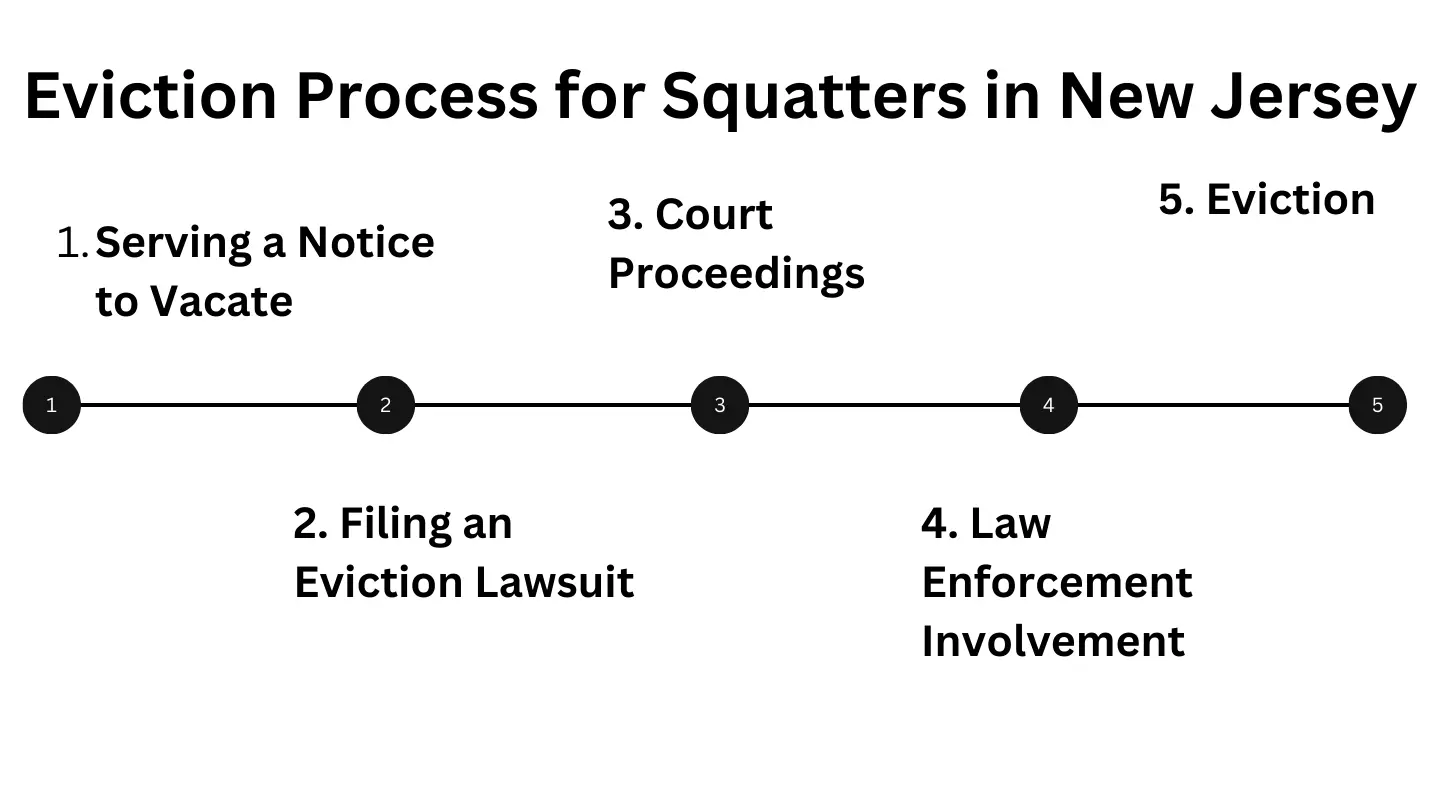Overview
Squatters in New Jersey present unique challenges to property owners and landlords. With a legal framework that can allow unauthorized occupants to eventually claim rights through adverse possession, understanding these laws is essential for protecting your investment.
In this comprehensive guide, we cover:
- The definition of squatters and how NJ distinguishes them from trespassers.
- The detailed process and legal requirements for adverse possession.
- The proper legal eviction process to remove squatters.
- Proactive strategies to prevent squatting on your property.
- Trusted government resources and legal references to guide property owners.
What Are Squatters Rights in New Jersey?
Squatters' rights in New Jersey refer to the legal protections available to individuals who occupy vacant, abandoned, or unmaintained properties without the owner's consent. While these occupants initially have no legal claim, if they meet stringent conditions over time, they may pursue an adverse possession claim.
It is important to note that:
- Squatters are not trespassers: Although both enter without permission, trespassing is a criminal offense, while squatting—if it meets legal criteria—is handled as a civil matter.
- Holdover tenants: Those with expired leases are treated differently from squatters, as they once had legal occupancy.
Understanding Adverse Possession in NJ
Adverse possession is the legal mechanism by which a squatter who has occupied a property continuously for a long period may eventually claim legal title. In New Jersey, the statute (NJ Rev Stat §§ 2A:14-30 to 32) outlines strict requirements for a successful claim.
To meet these requirements, a squatter must demonstrate:
- Hostile Possession: The occupation must be without the owner's permission, whether through a conscious trespass or an honest mistake regarding title.
- Open and Notorious Possession: The occupancy must be visible and obvious, leaving no doubt that the property is in use.
- Exclusive Possession: The squatter must be the sole occupant, maintaining control without sharing with others, including the owner.
- Continuous Possession: For residential properties, this must be maintained for at least 30 consecutive years (or 60 years for woodland or uncultivated lands).
- Actual Possession: The squatter must physically occupy and maintain the property, treating it as if they were the owner.
- Color of Title: The squatter must hold some documentation—often an imperfect deed—that appears to grant ownership for the entire period of occupation.
- Property Tax Payments: At least five consecutive years of tax payments during the occupation are required to bolster the adverse possession claim.
These stringent criteria make it challenging for a squatter to successfully claim ownership, but they also emphasize the need for vigilance on the part of property owners.
Eviction Process for Squatters in New Jersey
If you discover a squatter on your property, New Jersey law mandates that you follow the formal eviction process rather than resorting to self-help measures. The proper steps include:

- Serving a Notice to Vacate: Notify the unauthorized occupant that they must leave the property. This notice should comply with state requirements.
- Filing an Eviction Lawsuit: If the squatter does not vacate after receiving notice, initiate formal eviction proceedings in the appropriate New Jersey court.
- Court Proceedings: Present evidence that the occupant does not have a legal right to remain. The court will review documentation related to adverse possession requirements.
- Law Enforcement Involvement: Once the court issues a judgment for eviction, law enforcement will assist in the removal of the squatter.
Following these steps is crucial, as any attempts to forcibly remove a squatter without adhering to legal procedures can result in further complications or lawsuits.
Preventing Squatters
Prevention is the best defense against squatters. Property owners can adopt several proactive measures to secure their assets:
- Regular Inspections: Frequently check vacant properties to ensure they are not being occupied unlawfully.
- Security Enhancements: Install alarm systems, security cameras, and robust locks to deter unauthorized entry.
- Visible Maintenance: Keep properties looking occupied by maintaining landscaping, exterior lighting, and periodic upkeep.
- Clear Signage: Post “No Trespassing” signs to establish legal boundaries and discourage squatters.
- Professional Property Management: Consider hiring property managers who can monitor and secure your properties effectively.
Government Resources & Legal References
Staying informed about the legal framework governing squatters’ rights in New Jersey is essential. Here are some key resources:
- New Jersey Statutes: Review the statutes at NJ Legislature – specifically NJ Rev Stat §§ 2A:14-30 to 32 – for detailed legal requirements on adverse possession.
- New Jersey Department of Community Affairs (DCA): The DCA provides guidelines and resources for property owners. Visit the NJ DCA website for updates.
- Legal Aid Organizations: Resources such as Legal Services of New Jersey and Rutgers Legal Clinics offer free or low-cost legal advice regarding landlord-tenant disputes.
- New Jersey Courts: For information on filing eviction lawsuits and other legal proceedings, consult the New Jersey Courts website.
Frequently Asked Questions
Final Thoughts
Understanding New Jersey’s squatter’s rights and the complexities of adverse possession is vital for any property owner. By knowing the legal requirements, following due process for eviction, and taking proactive measures, you can better protect your investment.
Always stay informed and consult trusted government resources or legal professionals when dealing with unauthorized occupants. A proactive approach today can prevent long-term legal challenges tomorrow.
Try our free property valuation tool to gain real-time insights into your property's worth and secure your investment.

